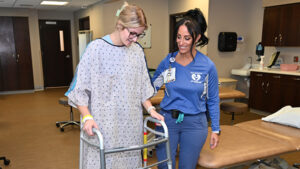Pharmacy Residency
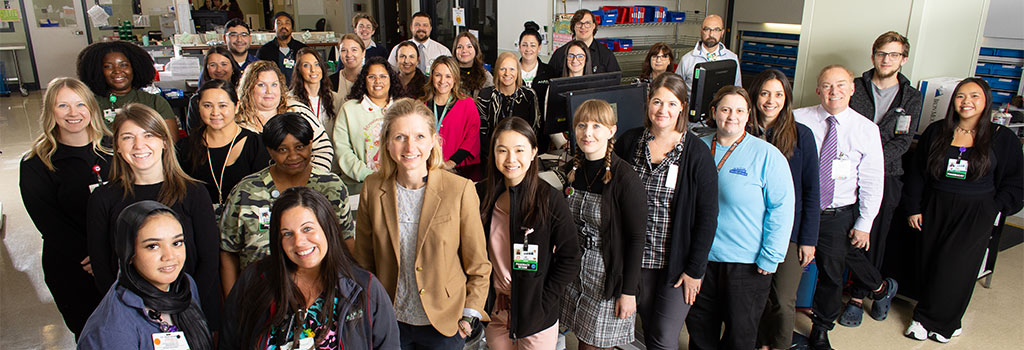
Welcome to the Erie County Medical Center (ECMC) PGY1 Pharmacy Residency Program. We are excited to offer a dynamic and comprehensive training experience that will prepare you to excel in acute care pharmacy practice. We take great pride in the quality and vitality of our residency programs and believe that you will find the diversity of specialties and highly qualified preceptors. Please take your time to learn more about our outstanding residency programs which will providing you with diverse opportunities to develop your clinical, leadership, and research skills in a collaborative and supportive environment.Successful completion fulfills the requirement for obtaining a New York State Dental licensure for those who have met all other requirements of eligibility.
Program Overview
The PGY1 Pharmacy Residency Program at Erie County Medical Center (ECMC) offers comprehensive training designed to develop future leaders in acute care pharmacy practice. As a Level 1 Adult Trauma Center and regional center for a variety of specialized services, ECMC provides residents with diverse learning opportunities in areas such as emergency medicine, infectious disease, and internal medicine. The residency program builds on the PharmD education and includes hands-on experiences that prepare residents to deliver patient-centered care, participate in interdisciplinary teams, and improve medication safety practices.
Residents will benefit from the structured yet flexible learning environment, with a mix of required and elective learning experiences. The program consists of 5 week required rotations in internal medicine 1 & 2, infectious diseases, kidney transplant, critical medicine, ambulatory care, and emergency medicine. Longitudinal experiences in leadership, research, teaching and learning, and population health foster a well-rounded skill set. Additionally, residents will complete a research project and present their findings at local or regional meetings, contributing to the advancement of pharmacy practice. Elective rotations are available in multiple areas of practice including Psychiatry, Antimicrobial Stewardship, and more.
With the support of a team of experienced preceptors and strong academic affiliations with the University at Buffalo School of Pharmacy and Pharmaceutical Sciences, ECMC’s PGY1 program equips residents with the knowledge, skills, and confidence needed to pursue board certification, advanced training, or a position in acute care pharmacy. The program emphasizes collaboration, innovation, and service excellence, ensuring that residents are well-prepared for successful careers in a dynamic healthcare environment.
About the Area
Buffalo, New York located in Western NY and lies along Lake Erie. It is well known for chicken wings, iconic winter storms, and over the top sports fan base. The city is also home to newly remodeled Buffalo AKG Art Museum as well as a history and science museum. Sheas Performing Arts and Buffalo Philharmonic Orchestra provide musical and theatre entertainment. The city is home to several professional sport teams: The Buffalo Bills, The Buffalo Sabres, The Buffalo Bisons, and The Buffalo Bandits.
Application Process
Application Deadline: January 3rd, 2025
- Curriculum Vitae
- Letter of Intent
- Three letters of reference uploaded to PhORCAS
- Pharmacy school transcripts
Residency Preceptors
Erin Occhino
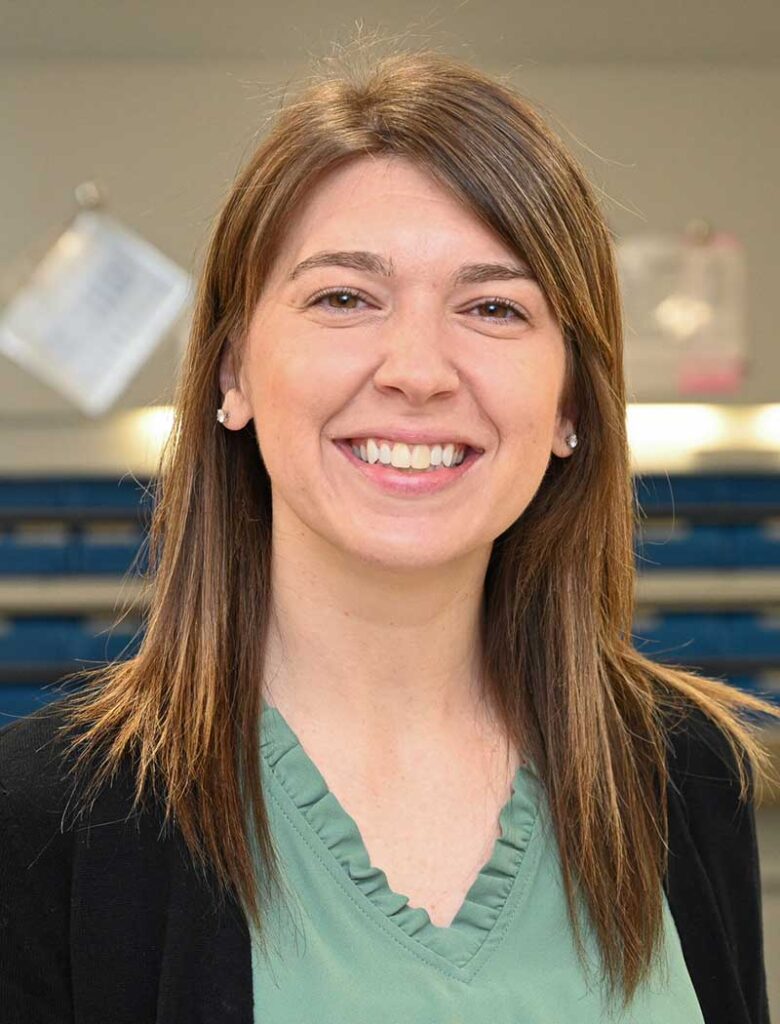
Rotations
- Infectious Diseases (Required)
- Antimicrobial Stewardship (Elective)
Erin Occhino, PharmD, BCPS, BCIDP earned a Doctorate of Pharmacy degree from D’Youville University. Upon graduation, she completed her PGY1 and PGY2 residency in Infectious Diseases at VA Western New York. She serves as a preceptor for APPE students and PGY1 residents in infectious diseases rotation and antimicrobial stewardship elective rotation.
Favorite Hobbies
- Reading
- Exercise (Spinning, Yoga)
- Cooking/Baking
Residency & Fellowship
PGY2 Infectious Diseases Pharmacy at VA Western NY Healthcare System 2016 – 2017
PGY1 Pharmacy Practice at VA Western NY Healthcare System 2015 – 2016
Education
Doctor of Pharmacy | D’Youville University Buffalo NY 2015
Kevin Chilbert
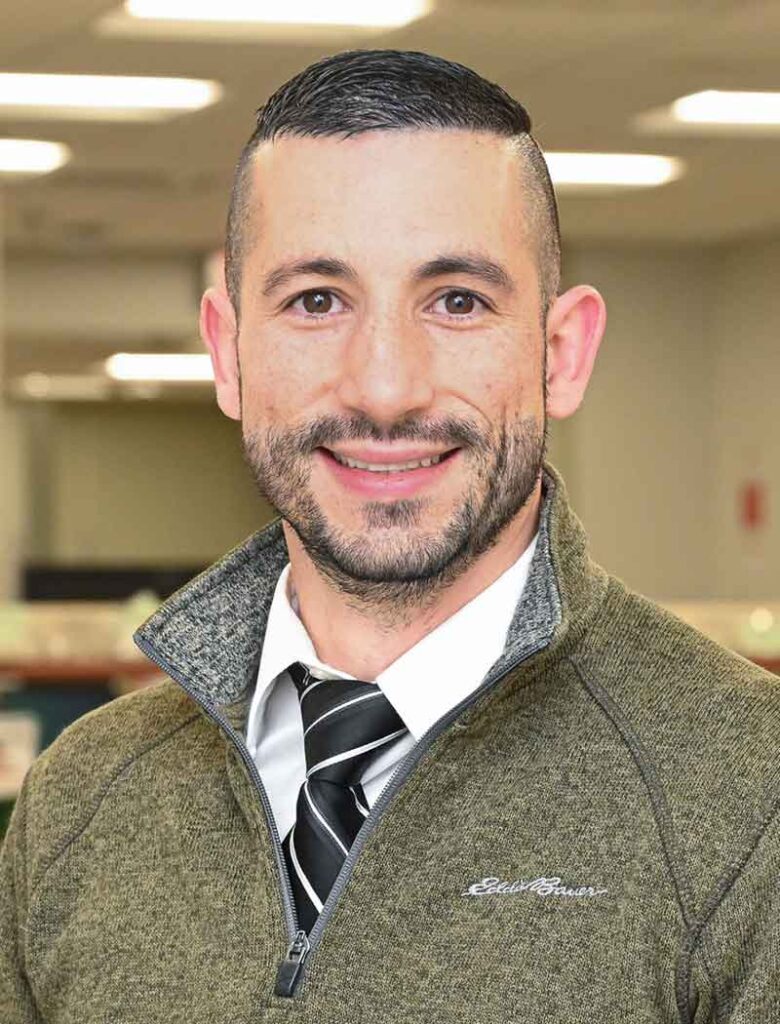
Rotations
- Emergency Medicine (Required)
Kevin Chilbert, PharmD, BCEMP, earned a Doctor of Pharmacy degree from University at Buffalo School of Pharmacy and Pharmaceutical Sciences. He completed a PGY1 pharmacy practice residency at Baptist Health Medical Center in Little Rock, Arkansas and a PGY2 Emergency Medicine residency at Cleveland Clinic Fairview Hospital.
He is currently working as the Emergency Medicine Clinical Pharmacy Specialist and focuses his attention to both the emergency department and comprehensive psychiatric program (CPEP) departments at ECMC. He serves as a preceptor for APPE students from several different pharmacy schools as well as PGY1 ECMC pharmacy residents, PGY2 critical care residents from Buffalo General Medical Center, PGY1 and PGY2 residents from Buffalo Psychiatric Center, and PGY2 Emergency Medicine Residents from Mercy Hospital of Buffalo.
He works per diem as an emergency medicine clinical pharmacy specialist per diem at Kenmore Mercy Hospital. He teaches toxicology as an adjunct clinical assistant professor to pharmacy students at the University at Buffalo School of Pharmacy and Pharmaceutical Sciences. He also regularly participates in interdisciplinary education for the UB|MD Emergency Medicine Residency Program.
Favorite Hobbies
- Traveling
- Trying new restaurants, food (except seafood…), and breweries
- Watching Netflix
- House projects
Residency & Fellowship
PGY2 Emergency Medicine Pharmacy Residency at Cleveland Clinic Fairview Hospital 2018 – 2019
PGY1 Pharmacy Practice Residency at Baptist Health Medical Center 2017 – 2018
Education
Doctor of Pharmacy | University at Buffalo School of Pharmacy and Pharmaceutical Sciences. 2017
Ashley Halloran
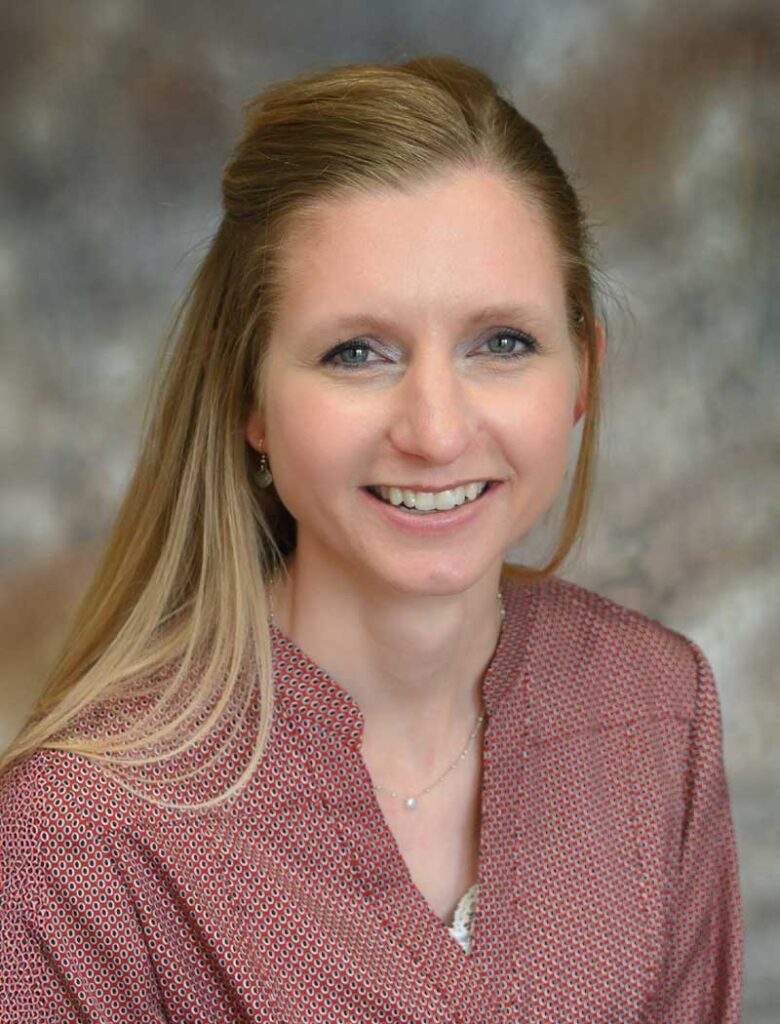
Rotations
- Leadership and Pharmacy Enterprise (Required)
Osteopathic Medicine (LECOM). Following graduation Ashley began her career at Upper Alleghany Health System serving in a variety of clinical and leadership roles until she joined ECMC in 2018. Ashley is currently the Vice President of Pharmacy Operations at ECMC, which involves the oversight of all the various roles of the pharmacy department throughout the organization. In her role Ashley provides strategic planning, guidance and leadership to the department. Ashley represents the pharmacy department in both enterprise-wide committees and taskforces as well as at regional and national healthcare workgroups. Additionally, she routinely staffs various positions within the department to maintain her clinical acuity.
Ashley serves as a preceptor for APPE students from several different pharmacy schools as well as ECMC’s PGY1 pharmacy residents.
Ashley is an active member of the workforce community where she serves a member or mentor with ECMC’s Office of Diversity, Equity & Inclusion, ECMC’s Professional Women’s Network and ECMC’s Young Professionals Network. Additionally, she is the current national chairperson for Acurity’s Pharmacy Advisory Committee.
Favorite Hobbies
- Anything outside!
Education
Doctor of Pharmacy | Lake Erie College of Osteopathic Medicine (LECOM), Erie PA. 2011.
Michael Ott PharmD BCPS
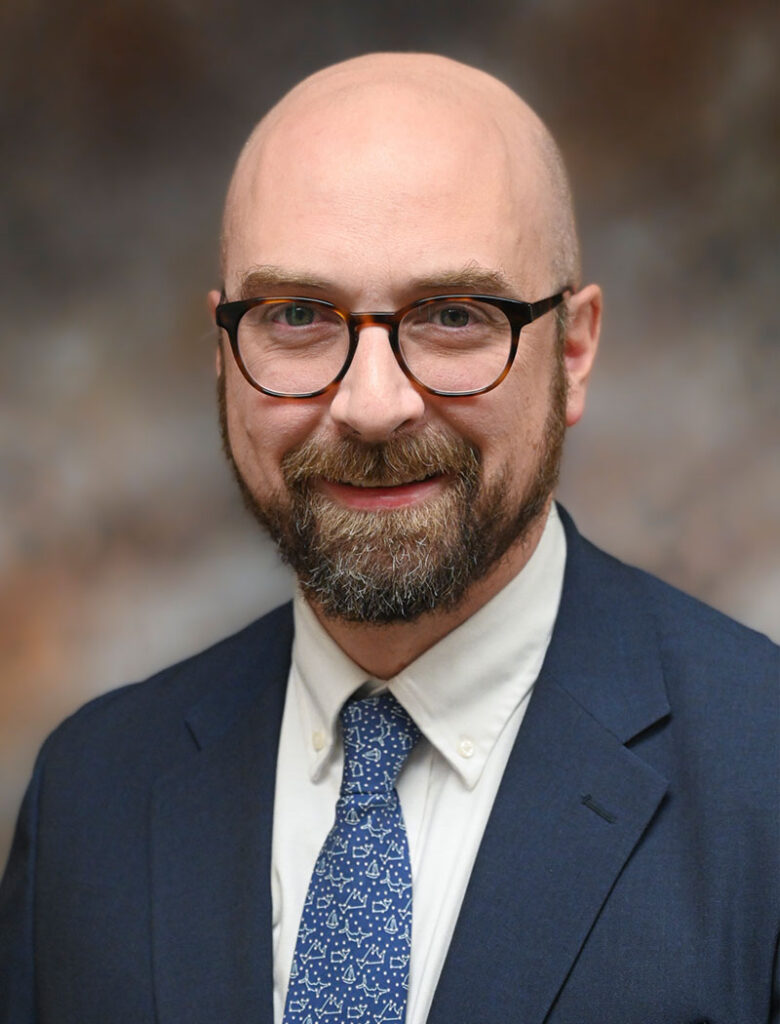
Rotations
- Transplant (Required)
- Research (Required)
- Internal Medicine 1 &2 (Required)
Michael earned his Doctor of Pharmacy Degree from Ohio Northern University Raabe College of Pharmacy then completed his PGY1 pharmacy practice residency at Buffalo General Hospital, Kaleida Health in Buffalo New York.
After residency training Michael relocated to Northeast Ohio where he was the Clinical Coordinator at Trumbull Memorial Hospital. At Trumbull Memorial Hospital Michael was the first clinical pharmacist served as an interim Director of Pharmacy and initiated many clinical programs. After four years in Ohio Michael moved back to Western New York to take his current role at Erie County Medical Center as Clinical Coordinator. Michael began the rebuilding of clinical pharmacy services at ECMC in critical care and eventually moved into the kidney transplant program and assists with the internal medicine rotation.
In 2010 he became the Residency Program Director for the PGY1 Residency in addition to his Clinical Coordinator duties. He precepts both clinical and research rotations for the residency and involves the residents in numerous multidisciplinary committees within the organization. He also is responsible for overseeing many industries sponsored investigational drug studies for the Department of Pharmacy.
Michael is a past president of the Western New York Society of Health System Pharmacists, has sat on multiple committees for the society, and continues to be active within the local pharmacy community.
He has taught classes about viral infections at D’Youville School of Pharmacy and precepts students from a variety of schools, including the University at Buffalo, D’Youville School of Pharmacy, St. John Fisher, and Rhode Island School of Pharmacy.
Favorite Hobbies
- Training Dogs
- Photography
- Hiking
- Travel
Residency & Fellowship
PGY1 Buffalo General Hospital Kaleida Health 2003-2004
Education
Doctor of Pharmacy | Ohio Northern University Raabe College of Pharmacy 2003
Natalie DelGuidice
Rotations
- Critical Care, Medical Intensive Care Unit (MICU)
Natalie DelGuidice, PharmD, BCPS, BCCCP graduated from the University of Minnesota College of Pharmacy in 2008. She completed a PGY-1 residency in Maine followed by a PGY-2 critical care residency at Kaleida Health. She is a Clinical Pharmacy Specialist in Critical Care and is currently practicing in the Medical Intensive Care Unit at ECMC.
At ECMC, Natalie has coordinated the Pharmacy and Therapeutics Committee and is presently an active member of the committee, regularly engaged in quality assurance projects. Natalie serves as a representative of the Pharmacy Department at various Nursing and Critical Care meetings. She has extensive experience creating and revising policies, order sets, and treatment algorithms for the hospital not only in critical care, but in various care settings.
Natalie has served as an adjunct faculty member at the University at Buffalo School of Pharmacy. She precepts APPE students from several schools and coordinates their longitudinal rotations. She mentors ECMC’s fourth year class of Pharmacy Interns and is a Critical Care preceptor for the ECMC PGY-1 residents. She serves on the ECMC Residency Advisory Committee and is a member of ACCP and SCCM.
Favorite Hobbies
- Time with family
- Cooking
- Gardening
- Traveling
Residency & Fellowship
PGY-1 Pharmacy Practice Residency, Eastern Maine Medical Center, Bangor ME
PGY-2 Critical Care Pharmacy Residency, Kaleida Health, Buffalo NY
Education
Doctor of Pharmacy, University of Minnesota College of Pharmacy, Minneapolis MN
Graziella Furnari
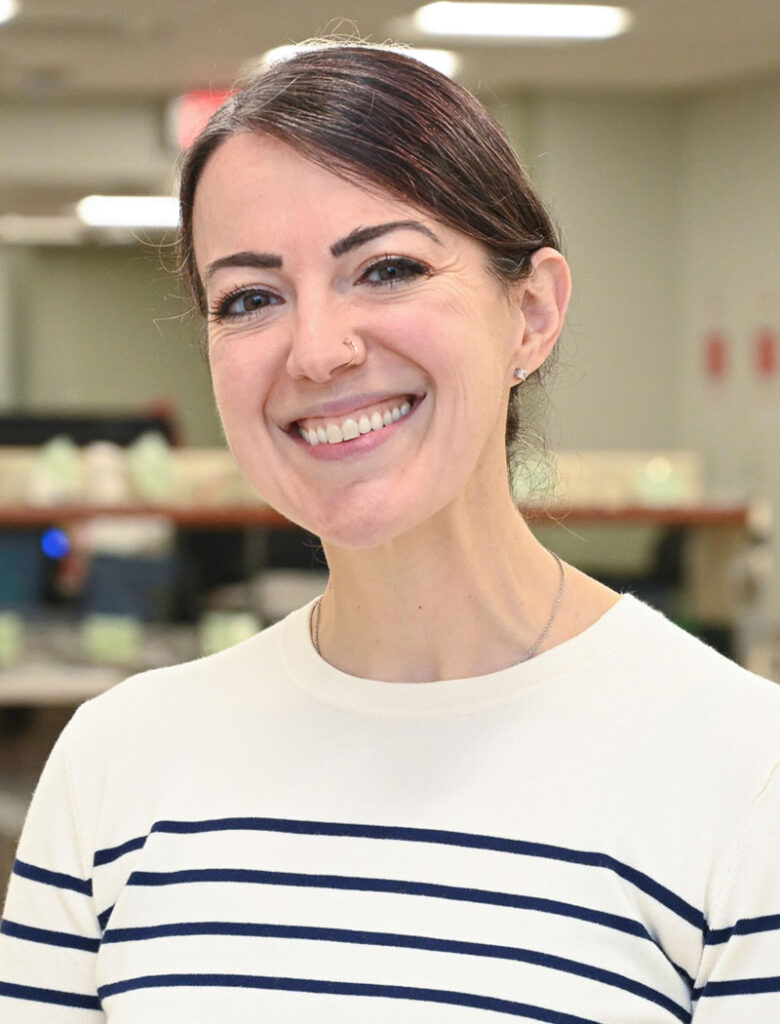
Rotations
- TBD
Favorite Hobbies
- TBD
Residency & Fellowship
TBD
Education
TBD
Calvin Meaney
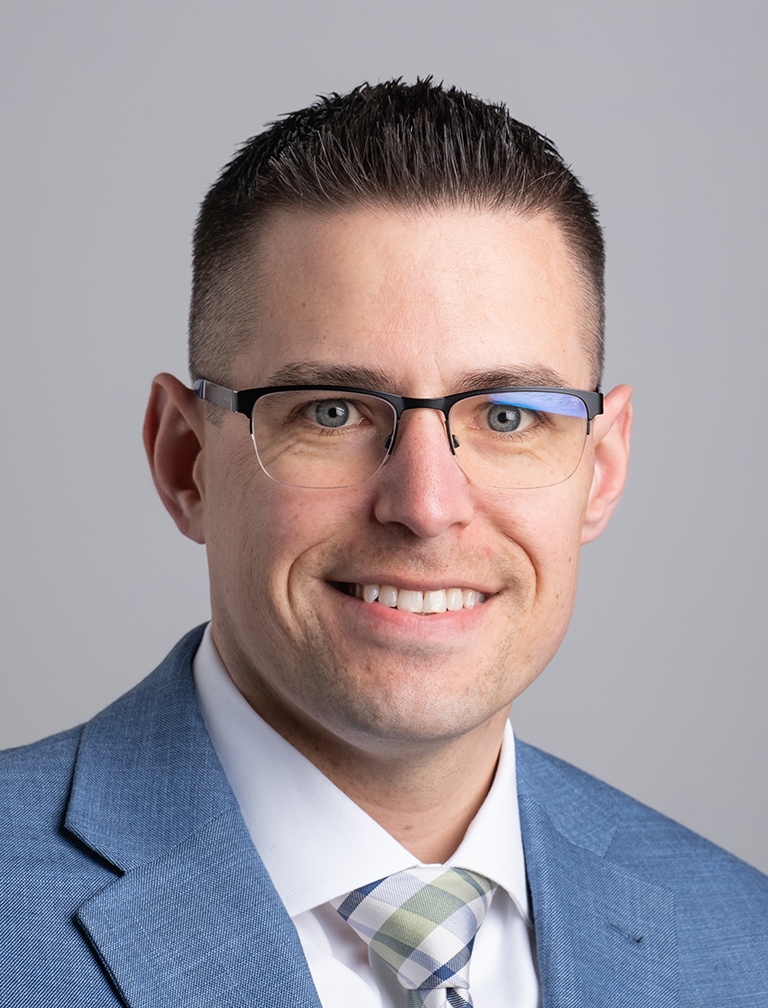
Rotations
- Internal medicine 1 and 2, Nephrology elective
Dr. Meaney is a clinical associate professor at the University at Buffalo School of Pharmacy and Pharmaceutical Sciences. Through this role, he maintains a practice site at ECMC on the Medicine D team; an interprofessional, academic, internal medicine team with a focus on geriatric patients. Through this role, he precepts pharmacy students and residents in a layered learning model. Recent innovations in clinical practice include a polypharmacy assessment and deprescribing intervention.
Dr. Meaney‘s research program focuses on improving the care and outcomes of patients with kidney failure. He leads a multidisciplinary group of researchers to improve anemia management in hemodialysis patients. Other work has focused on drug-induced nephrotoxicity and the optimal use of antibacterials in hemodialysis.
In the classroom, Dr. Meaney strives to excite and engage students through real-world application of pharmacotherapy using active learning techniques. He finds the personal interaction with students through advising and mentoring to be the most rewarding part of being a faculty member.
Favorite Hobbies
- Fishing
- Woodworking
- Hockey
- Cooking
Postgraduate Training
PGY-1 Pharmacy Practice, University of Maryland Medical Center
Fellowship, Immunosuppressive Pharmacology, University at Buffalo School of Pharmacy and Pharmaceutical Sciences
Education
Doctor of Pharmacy, University at Buffalo School of Pharmacy and Pharmaceutical Sciences
Randal Napierala
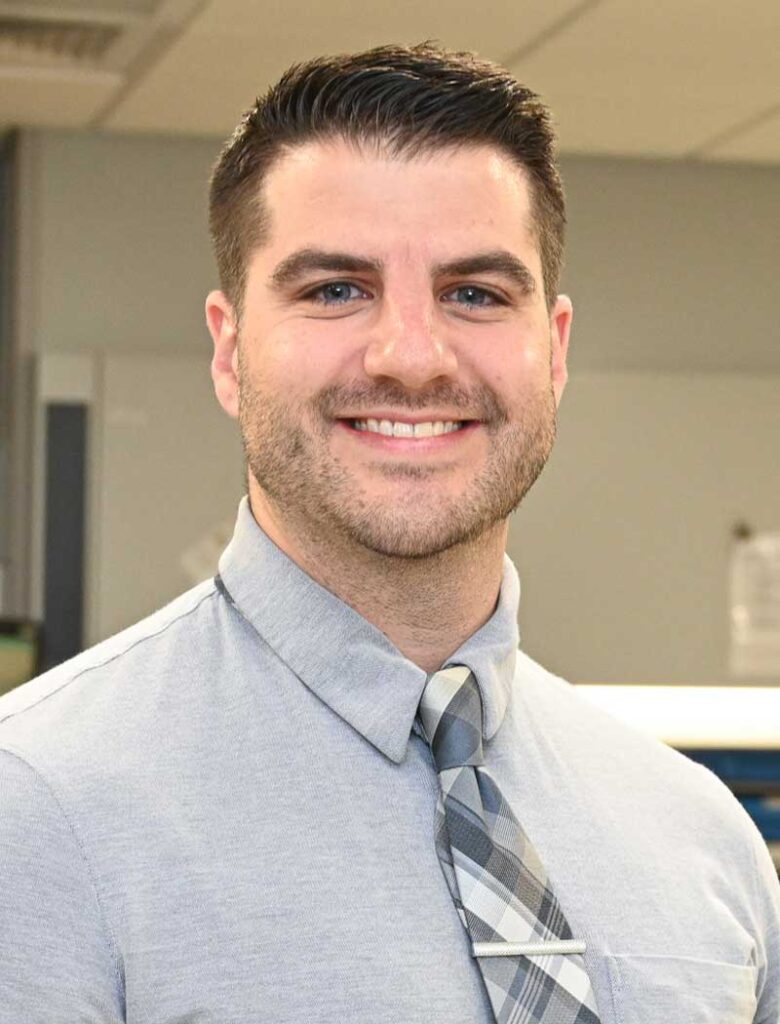
Rotations
- Pharmacy staffing longitudinal rotation, orientation/pharmacist orientation.
Randal Napierala PharmD, BCPS graduated from the university of D’Youville in 2017. He completed a PGY-1 Residency at the Western New York VA in 2018 and completed board certification for BCPS in 2019. He has worked many roles within ECMC’s pharmacy department including emergency medicine, transplant specialist as the behavioral health lead pharmacist. Randal most recently has taken the responsibility as the Charge Pharmacist in central pharmacy to ensure safe, effective and efficient delivery of patient care. Randal has served as an adjunct faculty member at the University at Buffalo School of Pharmacy. He serves on the ECMC Residency Advisory Committee, practice council committee, and central staffing committee.
Favorite Hobbies
- Exercise (running/bodybuilding), travel and spending time with my family
Residency & Fellowship
PGY-1 Pharmacy Practice Residency, VA Western New York Health Care. Buffalo, NY.
Education
Doctor of Pharmacy, D’Youville University. Buffalo, NY. Pharmacotherapy Specialty Certification (BCPS)
Christine Ruh
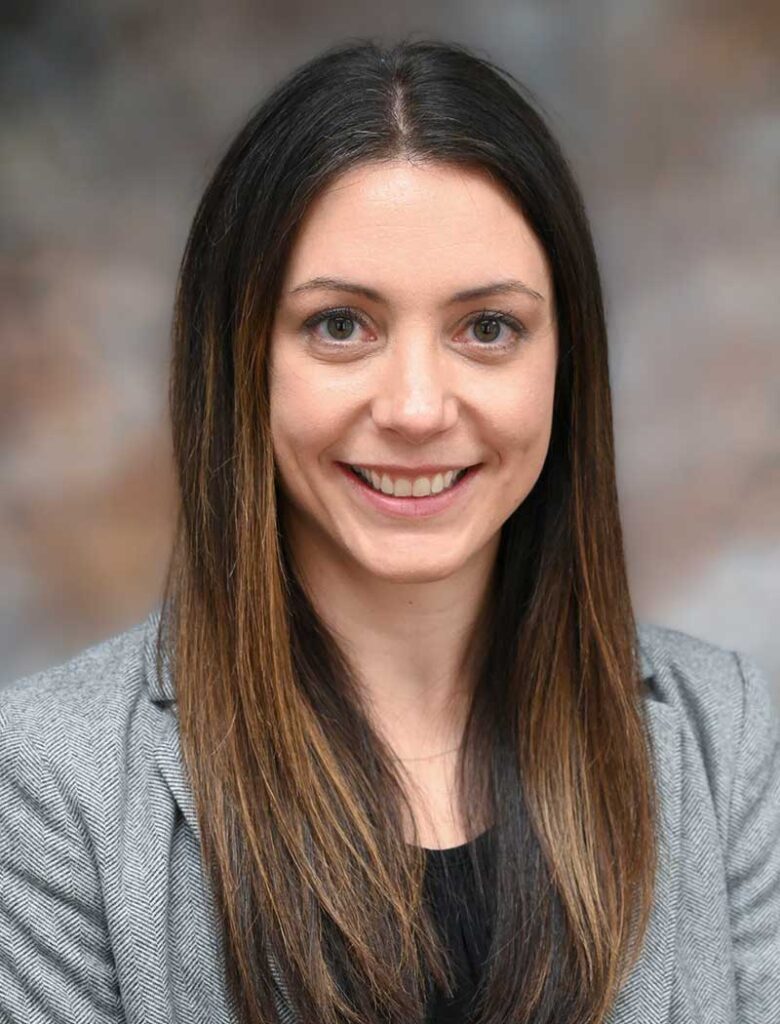
Rotations
- Longitudinal Population Health
- Specialty Pharmacy
Christine Ruh, PharmD, CSP graduated from the University of Rhode Island in 2013. She completed a PGY-1 pharmacy practice residency at the VA Western New York, where she then went on to complete a PGY-2 in Infectious Diseases. She started out at ECMC has the Infectious Diseases pharmacist for 5 years, where she developed and implemented the ECMC antimicrobial stewardship program. After those 5 years, she transitioned to a Clinical Pharmacy Specialist in the Ambulatory Area where she started the ECMC Specialty Pharmacy.
Currently she is the Assistant Director of Pharmacy, overseeing the ambulatory side which includes pharmacist in several centers: Family Medicine, Internal Medicine, You Center for Wellness (Immunodeficiency), Oncology, Infusion, Transplant, and a transition of care team. In addition to the Center Pharmacists, Christine is the PIC of the ECMC Specialty Pharmacy and oversees the efforts of the specialty pharmacy services team for ECMC. Additional responsibilities include overseeing the pharmacy intern program, participation in the 340B program, and oncology research.
Favorite Hobbies
- Horseback riding- Dusty is my horse
- Time with family
- Any outdoor activities- hiking, sailing, climbing
- Traveling
Residency & Fellowship
PGY-1 Pharmacy Practice Residency- VA WNY HCS
PGY-2 Infectious Diseases Residency- VA WNY HCS
Education
Doctor of Pharmacy, University of Rhode Island College of Pharmacy, Kingston, RI
Sarah Handley
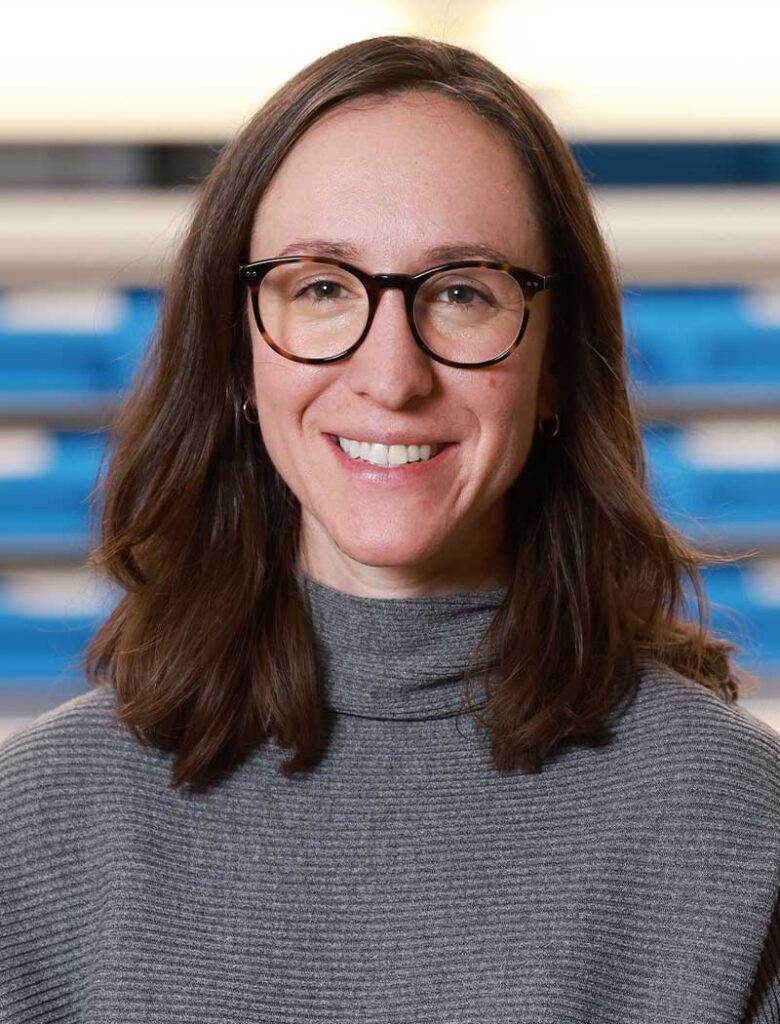
Rotations
- Ambulatory Care (Required)
Sarah Handley, PharmD, BCPS, BC-ADM earned a Doctor of Pharmacy degree from University at Buffalo. Following graduation Sarah has had various clinical roles in different inpatient settings including Sisters of Charity at Catholic Health, Unity Hospital of Rochester Regional, and ECMC. Sarah has found that her passion is serving patients in the Ambulatory Care setting. She has a year of service at the Neighborhood Health Center of WNY. She now practices at ECMC’s Internal Medicine Center Clinic.
Sarah has precepted pharmacy students at various schools throughout her career. She has been an ASHP residency preceptor at Unity Hospital as well as ECMC. Sarah was an acting chairperson at Rochester Area Society of Health-System Pharmacists.
Favorite Hobbies
- Anything outdoor-related: running, hiking, or walking my two adorable corgis.
Education
Doctor of Pharmacy | University at Buffalo School of Pharmacy and Pharmaceutical Sciences. 2013
Bachelor of Science, Pharmacology and Toxicology| University at Buffalo 2009
Possible Rotations/Curriculum
Ambulatory Care (Required)
The Ambulatory Care Rotation is an outpatient, required 5 week learning experience in the Internal Medicine Center at ECMC. IMC offers primary care services for adult patients. The healthcare team includes physicians, medical residents, physician assistants, nurses, social workers, a pharmacist, and administrative staff. Some of the services provided include treatment of common illness, long-term management of chronic conditions, preventive medicine and preventive care, physical examinations, health and wellness programs, blood testing and comprehensive lab services.
Topics Covered:
- Building an Ambulatory Care Pharmacy Practice
- Population Health Managment
- Transitions of Care Management
- Diabetes Mellitus Care
- Obesity and Weight Management
- Pain Management and Harm Reduction
- Urine Tox Screen and interpretation
- Opioid Tapering
- Benzodiazepine Tapering
- Safe Opioid prescribing
- Substance Use Disorder Treatment
- Perioperative medication management
- Navigating Prescription Drug Coverage and Cost Barriers
The pharmacist is responsible for assisting with the continuity of care of all transitions of care patients, patients managed within the diabetic protocol (A1c >8), and other chronic disease states. Caring for these patients may include glucometer teaching, diabetes education, medication administration training, and medication counseling. Routine responsibilities include but are not limited to patient education, medication reconciliation, identifying and resolving medication issues, identifying referrals to Specialty Pharmacy, suggesting therapeutic interchanges due to insurance coverage, patient counseling, assisting with prior authorizations and formulary drug coverage, and working within an interdisciplinary team.
Antimicrobial Stewardship (Elective)
Throughout this elective rotation, the resident will gain a variety of experiences optimizing antibiotic therapy for patients on the medical service, intensive care units, surgical units and in long-term care. The primary goal of the antimicrobial stewardship pharmacist is to provide the health system and patients a prospective and interventional approach to optimizing the use of antimicrobial agents. By the end of this rotation, the resident should be able to demonstrate a basic knowledge of pathologic infectious organisms and principles of microbiologic assessment including antibiotics and antifungal agents.
The resident will gain experience of empiric antibiotic regimens with optimal dosing as well as appropriate de-escalation interventions and duration of therapy recommendations. They will learn several principles of antimicrobial stewardship programs including prospective audit with feedback, authorization of restricted agents, IV to PO changes, and additional interventions.
Disease states that will be reviewed but are not limited include the following: pneumonia (community acquired and hospital associated), urinary tract infection, skin and soft tissue infections, bone and joint infections, intra-abdominal infections, opportunistic infections, antibiotic associated diarrhea (C. difficile infections), bacteremia, central nervous system infections, and surgical site infections.
Emergency Medicine (Required)
The Emergency Medicine Department at Erie County Medical Center serves as a Level 1 Trauma Center. The pharmacy resident will be an active part of the emergency medicine team and provide pharmaceutical care to critically and non-critically ill patients. The resident will be expected to provide medication order reviews, medication therapy monitoring, emergency response, education, medication procurement, and medication preparation. At the completion of this rotation, the resident should be able to provide direct patient care as part of an interdisciplinary emergency care team of providers, nurses, and other health care professionals. Problem identification/prioritization, problem solving, health care team interactions, communication skills, patient/family interactions, application of pharmacokinetics, and provision of drug information are emphasized through daily encounters with patients, the emergency medicine team, and other healthcare team members.
The resident will be expected to work collaboratively with all members of the healthcare team in the emergency department. They will provide the most up to date evidence-based drug therapy recommendations in real time. The resident will respond to all emergent/critical patients and help with medication procurement, optimization of medication selection, and serves as a medication administration resource. The resident will also act as a transitions of care advocate by providing medication reconciliations to patients admitted to the hospital and discharge counseling for patients being sent home with naloxone or other high-risk medications (e.g.
Infectious Disease (Required)
Throughout this required rotation, the resident will gain a variety of experiences optimizing antibiotic therapy for patients on the medical service, intensive care units, surgical units and in long-term care. The primary goal of the infectious diseases team is to provide the health system and patients a prospective and interventional approach to optimizing the use of antimicrobial agents. By the end of this rotation, the resident should be able to demonstrate a basic knowledge of pathologic infectious organisms, principles of microbiologic assessment, and knowledge of antimicrobial agents.
Through prospective audit and feedback as well as rounding with infectious disease consult service, the resident will gain experience of empiric antibiotic regimens with optimal dosing as well as appropriate escalation and de-escalation interventions and duration of therapy recommendations. Additionally, they will gain exposure of introductory microbiology lab practices.
Disease states that will be reviewed but are not limited include the following: pneumonia (community acquired and hospital associated), urinary tract infection, skin and soft tissue infections, bone and joint infections, intra-abdominal infections, opportunistic infections, antibiotic associated diarrhea (C. difficile infections), bacteremia, central nervous system infections, and surgical site infections.
Inpatient Medicine 1 (Required)
The general medicine inpatient rotation is a required, five week learning experience at Erie County Medical Center (ECMC). This is with the Medicine D Internal Medicine teaching service at ECMC. The medical service consists of an attending physician, PGY3 & PGY2 medical residents, PGY1 medical interns, and medical students (MS3 and MS4), clinical pharmacy faculty member and pharmacy students (P3 or P4). Occasionally this service also includes a geriatric fellow physician.
The pharmacy resident will be responsible for the care of all the patients on the medicine service (approximately 16-20 patients). Routine responsibilities include: identifying and resolving medication therapy problems (including vancomycin and aminoglycoside dosing), confirming the accuracy of the medication reconciliation, communicating with the medical team and pharmacy staff, and following ECMC policies and procedures. Residents must document their interventions in the pharmacy computerized database. Polypharmacy interventions will be made for all patients aged 65 years and above through the PCS system in MediTech. The preceptor will provide training on this clinical pharmacy intervention and documentation. In addition, the resident will participate in daily educational discussions with the medical team and pharmacy students.
Good communication skills and interpersonal skills are needed to successfully complete this rotation. The resident must be able to balance their time in order to provide optimal patient care.
Inpatient Medicine 2 (Required)
The internal medicine 2 rotation is a required, five week learning experience at Erie County Medical Center (ECMC). This is with the Medicine D Internal Medicine teaching service at ECMC. This is the second internal medicine rotation that the pharmacy resident will complete and is designed to show continued progress in clinical skills while demonstrating independence in practice and developing precepting skills.
The medical service consists of an attending physician, PGY3 & PGY2 medical residents, PGY1 medical interns, and medical students (MS3 and MS4), clinical pharmacy faculty member and pharmacy students (P3 or P4). Occasionally this service also includes a geriatric fellow physician. The pharmacy resident will be responsible for the care of all the patients on the medicine service (approximately 16-20 patients). Routine responsibilities include: identifying and resolving medication therapy problems (including vancomycin and aminoglycoside dosing), confirming the accuracy of the medication reconciliation, communicating with the medical team and pharmacy staff, and following ECMC policies and procedures. Residents must document their interventions in the pharmacy computerized database. Polypharmacy interventions will be made for all patients aged 65 years and above through the PCS system in MediTech. The preceptor will provide training on this clinical pharmacy intervention and documentation. In addition, the resident will participate in daily educational discussions with the medical team and pharmacy students. Good communication skills and interpersonal skills are needed to successfully complete this rotation. The resident must be able to balance their time in order to provide optimal patient care.
Precepting skills will be developed via daily interaction with pharmacy students, feedback Fridays, midpoint and final evaluations. Each day, the resident is expected to provide preceptorship via running daily pharmacy pre-rounds, asking students probing questions, providing feedback on verbal presentations, assessments/plans, and supervising students during team rounds with provision of real-time feedback for interventions. Each week, residents will provide summative feedback during “feedback Friday” to each student. Midpoint and final evaluations will be completed by resident and preceptor jointly.
Leadership and Pharmacy Enterprise (Required)
This learning experience will be based at Erie County Medical Center (ECMC) a 600+ bed Level I Trauma Center. ECMC provides inpatient acute care, psychiatric care, medical rehabilitation and substance abuse rehabilitation services along with operation more than 40 outpatient ambulatory care centers.
Residents will be actively involved in leadership and management of the Pharmacy Department during their learning experience. They will attend multiple meetings, taskforces and be integrated into at least one enterprise wide initiative. They can expect to have interaction with other department leaders as well as hospital senior and executive leadership.
While on rotation the resident will receive knowledge and work with key functions of the entire pharmacy department, included but not limited to personal management, policy and procedure development, pharmacy law (both State and Federal), supply chain, compliance, 340B and pharmacy finance.
Residents will complete several key readings and complete several projects to apply knowledge and key concepts gained during their rotation time.
Medical Intensive Care Unit (Elective)
The Medical Intensive Care Unit (MICU) rotation at Erie County Medical Center (ECMC) is a clinical experience focused on the care of critically ill medical patients.
The resident will gain a more in-depth understanding of critical care topics outlined in the required rotation through direct patient care experiences, literature review, topic discussions, and responses to questions about disease states and medications. Topics that were not covered in the required MICU rotation will be discussed, as well as exploring previously discussed topics but in more depth.
It is also an expectation of the resident to become familiar with the disease states of the patients they are actively providing care for. This may include researching these disease states on the residents own time, reviewing applicable information prior to rounds, and reaching out to the preceptor where necessary.
The resident will plan and perform a project and/or presentation that benefits the ICU, either by improving patient care or a particular care process.
Medical Intensive Care Unit (Required)
The Medical Intensive Care Unit (MICU) rotation at Erie County Medical Center (ECMC) is a clinical experience focused on the care of critically ill medical patients.
Expectations of the Rotation
- Reviewing patients with preceptor – Most mornings prior to rounds
- Morning interdisciplinary rounds – Daily, generally starting at 0800
- Afternoon or late morning discussions – Most days of the week, more so in the beginning of the rotation; discussions about patient cases, ongoing patient care issues, topic discussions, journal article reviews, and/or other pertinent topics
Critical Care Topics
The resident will be exposed to these areas through direct patient care experiences, literature review, topic discussions, and responses to questions about disease states and medications. Critical care topics may include, but are not limited to the following:
- General concepts and general support
- Pulmonary disorders
- Acid-base disorders
- Cardiac and cardiovascular disorders
- CNS disorders
- Renal and electrolyte disorders
- Infectious diseases
- Gastrointestinal disorders
- Sedation
- Toxicology
- Advanced Cardiovascular Life Support
- Targeted Temperature Management
Pharmacy Staffing (Required)
The pharmacy operations rotation is a required longitudinal (11 month) learning experience at Erie County Medical Center (ECMC) that primarily focuses on inpatient staffing responsibilities. This rotation aims to provide residents with the skills to function as a staff pharmacist by familiarizing them with day-to-day pharmacy department operations and workflow.
The resident can expect to be trained on and assist with a variety of tasks within central pharmacy including order entry/verification. The resident will be expected to assist with order review/verification, phone calls, and checking of unit dose and sterile medications as prepared by interns or technicians.
Additionally, the resident will progress through out the year and integrate clinical skills by recommendations and interventions regarding dosing for vancomycin, aminoglycosides, and warfarin. The resident will also have the opportunity to precept an intern during this time. Time management skills will also be tested as the resident will be expected to continue assisting in other staffing responsibilities when able.
Population Health (Required)
Throughout the residency year the resident will work on a longitudinal project in helping to close Population Health gaps identified for ECMC primary care patients. ECMC participates in The Clinical & Transformation Program (CIT) to help optimize patient quality of care and improve performance in quality incentive programs. In coordination with ECMC’s Population Health Team, GLIN IPA, and ECMC’s ambulatory care pharmacists, the pharmacy resident will be responsible for helping to improve performance in pharmacy centric value-based programs.
The pharmacy resident will participate in quarterly GLIN meetings for the institution and will follow annual metrics in-order to help optimize patient care. In addition to the meetings, the resident will work through an assigned patient list to assist with closing treatment gaps in relation to medication metrics. The primary preceptor will help the pharmacy resident develop a workflow in coordination with ECMC Ambulatory Centers and pharmacists.
Project and Research (Required)
Throughout the residency year the resident will complete one major primary research project relating to a specific aspect of pharmacy practice. The primary research project may involve the development, enhancement, or evaluation of a current practice, may be a problem-solving exercise, or may involve original research. The resident must be involved in each step of the primary research project from the point of protocol development including study design, conducting literature searches, obtaining IRB & research approval, data collection, assisting in data interpretation, and presenting the results of the study upon completion. The project should be able to be completed during the residency year.
The resident will present the findings of their study at a national, regional, state, or local meeting when available. The resident may also present their findings to any appropriate group or committee within the hospital. The RPD and preceptors will help the residents choose projects that will not only meet the accreditation standards but will also benefit the resident and the institution.
The resident will write a final report and possibly a manuscript detailing the project upon its completion, with the option to seek publication if desired and deemed appropriate by the preceptor and other investigators.
The resident will be assigned a primary preceptor, and with the help of the RPD choose a primary investigator and or co-investigators, if necessary, based upon the focus area of their project. The resident will be exposed to the institutional review board (IRB) the clinical research committee, and the processes that must be followed to obtain approval from both.
Transplant (Required)
The transplant rotation is a required 5 week learning experience. During the 5 weeks the resident will participate in both the inpatient and ambulatory care of the transplanted patient. The transplant service is a multidisciplinary service as defined by CMS. Our team consists of transplant surgeons, transplant nephrologists, nurse practitioners, clinical pharmacists, social workers, financial coordinators, and dieticians. The team may also consist of a surgical intern, medical student, pharmacy students, and nurses.
The inpatient transplant team follows kidney, kidney/pancreas, and pancreas transplant patients post operatively in the acute phase to ensure adequate care through discharge. The transplant team also follows patients previously transplanted and admitted for other acute reasons including but not limited to rejection, infection, or decline in graft function. Every member of the team has an essential part in post operative care and patient education at discharge. The team is also responsible for following solid organ transplant patient consults.
The ambulatory clinic provides care for post solid organ transplant, donors and recipients. It also hosts the transplant program’s pre-transplant evaluation and education of recipients, candidates, as well as living donors.
Topics Covered Topics will be learned through direct patient care experiences, literature review, or topic discussions (with the preceptor, pharmacy students, and/or the transplant team)
Topics may include but are not limited to:
- Basic transplant immunology
- Complications of ESRD
- Kidney Allocation System
- Deceased Donor and Living Donor Transplantation
- Transplant surgery
- Immunosuppression and prophylaxis regimens
- Opportunistic infections
- Rejection
- Post-transplant Lymphoproliferative disorder (PTLD)
- New Onset Diabetes Mellitus after Transplant (NODAT)
- Family planning post-transplant
Transplant Ambulatory Clinic (Elective)
The Transplant Ambulatory Care Clinic is an elective 5 week rotation, occurring Monday – Thursday within the Erie County Medical Center (ECMC) Transplant clinic. The ambulatory clinic is a multidisciplinary practice, providing care for pre and post solid organ transplant donors and recipients. The solid organ transplant team consists of attending nephrologists, transplant surgeons, nurse practitioners and clinical pharmacists. Other disciplines include nephrology or transplant fellows, fourth year medical students, phlebotomists, dietary, RNs, transplant coordinators, social work, financial coordinator, medical assistant, intake/clerical assistants are all integral components of the practice setting.
The clinic hosts the transplant programs pre-transplant evaluation of candidates for kidney and pancreas transplantation for both living donor and deceased donors. The multidisciplinary clinic team provides patient evaluation and patient education for living donors and their recipients in addition to deceased donor transplant recipients from pre-donation through discharge and subsequent follow-up.
Transplant Topics:
Topics will be learned through direct patient care experiences, literature review, or topic discussions (with the preceptor and/or transplant team.)
Topics may include but are not limited to:
- Dosing, and monitoring of immunosuppression
- Medication Adherence and Barriers to compliance
- Post Transplant Complications
- Anemia Management
- Rejection
- Post Transplant Diabetes Mellitus
Transplant Inpatient (Elective)
The transplant inpatient rotation is an elective 5 week learning experience. Our team consists of transplant surgeons, transplant nephrologists, nurse practitioners, clinical pharmacists, social workers, financial coordinators, and a dietician. The team may also consist of a surgical intern, medical student, pharmacy students, and nurses. The inpatient transplant team follows renal or pancreas transplant patients post operatively in the acute phase to ensure adequate care through discharge. Every member of the team has an essential part in post operative care and patient education at discharge. The team is also responsible for following solid organ transplant patient consults.
Topics Covered
Topics will be learned through direct patient care experiences, literature review, or topic discussions (with the preceptor, pharmacy students, and/or the transplant team)
Topics may include but are not limited to:
- Complications of ESRD
- Kidney Allocation System
- Deceased Donor and Living Donor Transplantation
- Transplant surgery
- Immunosuppression and prophylaxis regimens
- Opportunistic infections
- Rejection
- Post Transplant Lyphoproliferative disorder (PTLD)
- New Onset Diabetes Mellitus after Transplant (NODAT)
- Family planning post transplant
Trauma Intensive Care Unit (TICU)
The Critical Care rotation at Erie County Medical Center (ECMC) is a clinical patient-centered experience, 5 weeks in length, focused on the care of critically ill patients in the Trauma Intensive Care Unit (TICU). The primary emphasis of the rotation is to develop the entry level expertise in pharmacotherapy of the critical care patient and their pharmacotherapy management. The resident will also strengthen their communication skills within a diverse teaching service and enhance their teaching skills by educating medical/surgical residents, as well as precepting pharmacy students on critical care rotations as time allows.
As an essential component of the multidisciplinary team in the intensive care unit, the role of the clinical pharmacist on the TICU team strives to positively impact patient safety, outcomes, and drug costs by providing drug information and evidence-based patient-specific drug therapy recommendations. The TICU pharmacist participates daily in patient care rounds with the teaching service team which consists of the attending physician and residents from a variety of disciplines including surgery, emergency medicine and anesthesia. Additional members of the team may include the nurse case manager, dietitian, respiratory therapy, medical students [MSIV], pulmonary fellow, and residents from orthopedics, neurosurgery and/or ear nose and throat. Through an established clinical practice, the pharmacist makes therapy recommendations for critically ill patients which includes but is not limited to shock and vasopressor management, therapeutic drug monitoring, antimicrobial therapies for septic shock and infectious diseases, traumatic brain injury management, anticoagulation, and sedation and delirium management. The clinical pharmacist also provides guidance on general support of the critically ill patient, such as fluid, electrolyte, and nutrition management, prevention of venous thrombosis, stress ulcer prophylaxis, intravenous to enteral therapy conversions, and other practical issues involved in the care of the critically ill. In addition, when needed the TICU pharmacist obtains medication histories, participates in advanced cardiac life support, files adverse drug event reports, and procures needed medications.
During this rotation the goal of the resident will be able to assume the role of the clinical specialist in the TICU. The resident should be able to demonstrate leadership skills for successful self-development in the provision of care for critically ill patients. The average patient load in the TICU service is 15-18 patients, with admissions to the TICU team occurring 24 hours per day. By the end of the rotation the resident will have a basic understanding of multiple aspects of critical care pharmacy. The resident will use knowledge and skills gained during the rotation to prepare and deliver a final presentation to an audience which may include pharmacists, providers, nurses, and other healthcare professionals. The successful resident will continue to work toward proficiency in time management, communication, and ability to work effectively as a member of a multidisciplinary team. The resident will also ensure continuity of care during transition of critically ill patients between care settings, provide effective medication and practice-related education to critically ill patients, health care professionals and students, and effectively employ appropriate preceptor rolls when engaged in teaching students or fellow health care professionals in critical care.


